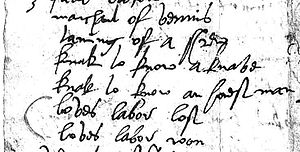Love's Labour's Won

Love's Labour's Won is the name of a play written by William Shakespeare before 1598. The play appears to have been published by 1603, but no copies are known to have survived. One theory holds that it is a lost work, possibly a sequel to Love's Labour's Lost. Another theory is that the title is an alternative name for a known Shakespeare play.
Theories and evidence
The first mention of the play occurs in Francis Meres Palladis Tamia, Wits Treasury (1598) in which he lists a dozen Shakespeare plays. His list of Shakespearean comedies reads:
- "for Comedy, witnes his Ge[n]tleme[n] of Verona, his Errors, his Love's labors lost, his Love's labours wonne, his Midsummers night dreame, & his Merchant of Venice".
Shakespeare scholars have several theories about the play. The first is that Love's Labour's Won may have been a lost sequel to Love's Labour's Lost, depicting the further adventures of the King of Navarre, Berowne, Longaville, and Dumain, whose marriages were delayed at the end of Love's Labour's Lost.[1] In the final moments of Love's Labour's Lost the weddings that customarily close Shakespeare's comedies are unexpectedly deferred for a year without any obvious purpose for the plot, which would allow for the events of a sequel.
Another longtime theory held that Love's Labour's Won was an alternative name for The Taming of the Shrew, which had been written several years earlier and is noticeably missing from Meres' list. However, in 1953, one Solomon Pottesman, a London based antiquarian book dealer and collector, discovered the August 1603 book list of the stationer Christopher Hunt, which lists as printed in quarto:
- "marchant of vennis, taming of a shrew, ... loves labor lost, loves labor won."
The find provided evidence that the play might be a unique work that had been published but lost and not an early title of The Taming of the Shrew.[2]
Yet another possibility is that the name is an alternative title for another Shakespearean comedy not listed by Meres or Hunt.[3] Much Ado About Nothing, commonly believed to be written around 1598,[4] is often suggested, as is All's Well That Ends Well. For example, Henry Woudhuysen's Arden edition (Third Series) of Love's Labour's Lost lists a number of striking similarities between the two plays.[specify] However, Much Ado about Nothing is also listed under another alternative title, Bendick and Beatrice, in several book seller's catalogues, and it is unlikely that it would have been known by two alternative titles. {{citation}}: Empty citation (help)
Leslie Hotson speculated that Love's Labour's Won was the former title of Troilus and Cressida, pointing out that Troilus and Cressida did not appear in Palladis Tamia, a view that has been criticised by Kenneth Palmer for requiring a "forced interpretation of the play". In addition, the play is generally considered to have been written c. 1602.[5]
Popular culture
In Caryl Brahms and S. J. Simon's satiric novel No Bed for Bacon (1941), Shakespeare tries to find time during the rehearsals of his plays to write Love's Labour's Wonne but never gets beyond the title. It is also featured in the novels Love Lies Bleeding (1948) by Edmund Crispin, Ruled Britannia (2002) by Harry Turtledove, Harvard Yard (2003) by William Martin, and What Time Devours (2009) by A.J. Hartley. It is mentioned in the 1993 comedy drama Shakespeare Country by Peter Whelan, whose character Billy recites the purported opening lines, in I, Elizabeth (1994) by Rosalind Miles, and in The 39 Clues: Book 10: Into the Gauntlet by children's book author Margaret Peterson Haddix.
The play is featured in "The Shakespeare Code", an episode of the science fiction television series Doctor Who first broadcast on 7 April 2007. In the episode, the play is lost because it was written under the influence of magic as a spell to bring forth the end of the world by the Carrionites, a witchlike race. When their plan is foiled, all copies of the cataclysmic play are expelled with them.
In the series of books 39 Clues "Love's Labour Won" is a play about reuniting the Cahill family, which was divided in branches: Lucian, Ekaterina, Tomas, Janus and Madrigal. In the series, Shakespeare was himself portrayed as a Madrigal.
References
- ^ John Berryman, Berryman's Shakespeare: essays, letters and other writings, Tauris Parke Paperbacks, 2001, p.lii.
- ^ Baldwin, T. W. Shakespere’s Love’s Labor’s Won. Carbondale: Southern Illinois University Press, 1957.
- ^ "SHAKESPER 2005: Love's Labours Won". Shakesper 2005. 2005. Retrieved 16 November 2008.
- ^ See textual notes to Much Ado about Nothing in The Norton Shakespeare (W. W. Norton & Company, 1997 ISBN 0-393-97087-6) p. 1387
- ^ Kenneth Palmer (1982). "Introduction". Troilus and Cressida (Arden Shakespeare: Second Series ed.). London: Methuen. p. 18. ISBN 0-416-17790-5.
Bibliography
- Baldwin, T.W. Shakespeare's Love's Labour's Won: New Evidence from the Account Books of an Elizabethan Bookseller. Carbondale: Southern Illinois University Press, 1957.

